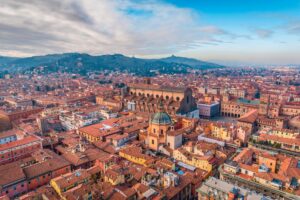What is a “Smart City”?
Cities are reflections of human progress; humans make the cities in which they live. When designing the Smart Cities of the future, we must therefore never forget who stands at the centre of this process, namely its citizens and their continuously evolving values and priorities.
In September 2015, as part of the Agenda 2030, the UN provided a mandate to all governments and all people everywhere to make cities and human settlements inclusive, safe, resilient and sustainable (Sustainable Development Goal 11) 1“Transforming our world: the 2030 Agenda for Sustainable Development.” No Date. https://sdgs.un.org/goals. This is a massive task that calls on human resourcefulness to drive the innovation needed to ensure our cities become part of the solution rather than part of the problem of our 21st century challenges. Designing and implementing Smart City strategies will lead to some of the many solutions needed for the 21st century cities which will put humanity’s ingenuity to the test once again.
Many definitions of “Smart City” exist. Most include the integration of digital technologies and social components such as inclusivity and equity as well as good governance resulting in innovative models that produce more intelligent, efficient, sustainable and equitable cities, all while reducing costs and resource consumption, thus improving the overall well-being of the citizen and as such meeting the Agenda 2030 objectives.
Why are digital technologies important?
A key component of Smart Cities is the use of digital technologies including:
- The collection and use of data from citizens, devices, buildings, and assets
- Information and Communication Technologies (ICT), such as telephones, radio, tv, internet
- Internet of Things (IoT), such as smart thermostats, health monitors, smart traffic flow technologies
The role of digital technologies is essential in delivering Smart Cities as they facilitate the optimisation of assets, resources and services that run the city. This includes data collection and analysis combined with the use of real-time responsive devices in homes and industry all manageable through ICT systems. When used in the appropriate manner they can optimise the management of many elements of Smart Cities including traffic and transportation systems, power plants, utilities, urban forestry, buildings, water supply, waste management, information systems, schools, libraries, hospitals, and other community services 2Sam Musa, “Smart Cities-A Road Map for Development”. IEEE Potentials. 37 (2): 19–23, 2018.
How do digital technologies support social progress and good governance?
Cities are “smart” both in the ways in which their governments harness technology as well as in how they optimise the use and analysis of data to engage more effectively and actively with its citizens as well as how they govern the city. Digital technologies can help local authorities improve service delivery, decision-making processes, and citizen engagement 3Simon N. Meade-Palmer, “Smart Cities: Harnessing Technology for Sustainable Urban Development,” Technopreneurship236.com, 2024. https://technopreneurship360.com/2023/09/16/technopreneurship-and-smart-cities/. Furthermore, at the heart of Smart City governance lies innovative data-driven decision making and deployment of state-of-the-art technologies all of which can help enhance transparency in how decisions are made and how resources are allocated more equitable, there by increasing accountability and trust between city officials and residents.
The sharing and using of data in smart cities are not limited to the city itself but also includes businesses and other third parties that can inform and optimise their services or products and integrate multiple sectors for overall optimisation. Sharing, using and analysing data from different systems and sectors can help optimise usage and creates opportunities for increased understanding and economic benefits 4Meade-Palmer, “Smart Cities: Harnessing Technology for Sustainable Urban Development”.
As a result of the high concentration of economic activity and innovation, cities have a unique potential for leading a social and physical transformation that is more equitable and sustainable for all its citizens. A “Smart City” is a city that continues to adapt – both physically and socially – as the needs and demands change and as technology and innovations evolve.
- Learn more about the EU Net Zero Smart Cities
- Learn more about What is a Smart City?
Real World Examples
 Bologna 5Anthony Cloclough, “Bologna’s Bet on Climate Change.” January 23, 2024. https://eurocities.eu/stories/bolognas-bet-on-climate-neutrality/
Bologna 5Anthony Cloclough, “Bologna’s Bet on Climate Change.” January 23, 2024. https://eurocities.eu/stories/bolognas-bet-on-climate-neutrality/
The Mission of 100 Climate-Neutral and Smart Cities by 2030 – For and by Citizens is: “Perhaps our last opportunity to transform our cities into healthier, safer, child-friendly places, where we can reconnect with nature and find energy to face the new phase of humanity we have entered”. For Bologna, being part of the Mission is more than just a question of climate. It’s about improving economic accessibility to ecological choices, fighting against energy poverty, further democratising cities, and creating narratives that help face this new century of constant emergency.
Anna Lisa Boni, Deputy Mayor, Bologna
- Bologna is one of 100 EU Smart Cities: Missione Clima
- Comune di Bologna: Sportello Energia (Italian)
- Video: Is Copenhagen the World’s Most Sustainable City?
Bibliography
- Anthony Cloclough, “Bologna’s Bet on Climate Change.” January 23, 2024. https://eurocities.eu/stories/bolognas-bet-on-climate-neutrality/
- European Commission, “Smart Cities.” No date. https://commission.europa.eu/eu-regional-and-urban-development/topics/cities-and-urban-development/city-initiatives/smart-cities_en
- ICLEI, “Digitalization: A Game Changer for Local Governments & Communities Enhancing Capacities to Deploy Transformative Solutions.” ICLEI Policy Brief, 2023.
- McLaren, Duncan and Agyeman, Julian, “Sharing Cities: A Case for Truly Smart and Sustainable Cities,” MIT Press, 9780262329705, 2015.
- Moura, Filipe and de Abreu e Silva, Joao, “Smart Cities: Definitions, Evolution of the Concept and Examples of Initiatives.” 10.1007/978-3-319-71059-4_6-1, 2019.
- Musa, Sam, “Smart Cities-A Road Map for Development”. IEEE Potentials. 37 (2): 19–23, 2018.
- OECD, “Enhancing the Contribution of Digitalisation to the Smart Cities of the Future.” OECD, 2019.
- Simon N. Meade-Palmer, “Smart Cities: Harnessing Technology for Sustainable Urban Development.” Technopreneurship236.com, 2024.
- “Transforming our world: the 2030 Agenda for Sustainable Development.” 2015. https://sdgs.un.org/2030agenda

